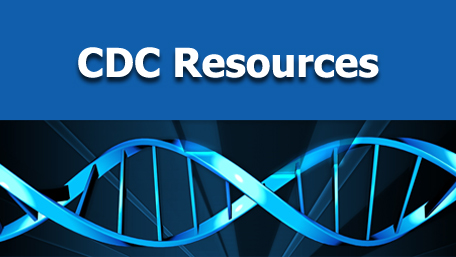J Pain Symptom Manage. 2016 Sep 21. pii: S0885-3924(16)30303-7. doi: 10.1016/j.jpainsymman.2016.04.014. [Epub ahead of print]
Polymorphisms in Cytokine Genes are Associated with Higher Levels of Fatigue and Lower Levels of Energy in Women Following Breast Cancer Surgery.
Abstract
CONTEXT:
OBJECTIVES:
METHODS:
RESULTS:
CONCLUSION:
Copyright © 2016. Published by Elsevier Inc.
KEYWORDS:
breast cancer; cytokine genes; energy; fatigue; growth mixture modeling; symptom trajectories
- PMID:
- 27664835
- DOI:
- 10.1016/j.jpainsymman.2016.04.014
- [PubMed - as supplied by publisher]
Public Health Genomics Knowledge Base (v1.2)

Hereditary Breast and Ovarian Cancer
This week is hereditary breast and ovarian cancer (HBOC) week. For information on HBOC check out our new web pages and CDC BringYourBrave campaign website.

Last Updated: Sep 30, 2016
- Polymorphisms in Cytokine Genes are Associated with Higher Levels of Fatigue and Lower Levels of Energy in Women Following Breast Cancer Surgery.
Kober Kord M, et al. Journal of pain and symptom management 2016 9 - BRCA mutations and survival in breast cancer: an updated systematic review and meta-analysis.
Zhu Yaning, et al. Oncotarget 2016 9 - Clinically Significant Unclassified Variants in BRCA1 and BRCA2 Genes Among Korean Breast Cancer Patients.
Yoon Kyong-Ah, et al. Cancer research and treatment : official journal of Korean Cancer Association 2016 9 - Psychosocial outcomes and counselee satisfaction following genetic counseling for hereditary breast and ovarian cancer: A patient-reported outcome study.
Oberguggenberger Anne et al. Journal of psychosomatic research 2016 Oct 8939-45 - The Circadian Rhythm Gene Arntl2 Is a Metastasis Susceptibility Gene for Estrogen Receptor-Negative Breast Cancer.
Ha Ngoc-Han, et al. PLoS genetics 2016 9 (9) e1006267 - A case-control study about the association between vascular endothelial growth inhibitor gene polymorphisms and breast cancer risk in female patients in Northeast China.
Han Shaoli, et al. Chinese journal of cancer research = Chung-kuo yen cheng yen chiu 2016 8 (4) 435-43 - The role of MDM4 SNP34091 A>C polymorphism in cancer: a meta-analysis on 19,328 patients and 51,058 controls.
Jin Xin, et al. The International journal of biological markers 2016 8 0 - Whole-exome sequencing and targeted gene sequencing provide insights into the role of PALB2 as a male breast cancer susceptibility gene.
Silvestri Valentina, et al. Cancer 2016 9 - Evidence that the 5p12 Variant rs10941679 Confers Susceptibility to Estrogen Receptor-Positive Breast Cancer through FGF10 and MRPS30 Regulation.
Ghoussaini Maya, et al. American journal of human genetics 2016 9 - Psychological factors associated with the intention to choose for risk-reducing mastectomy in family cancer clinic attendees.
van Driel C M G, et al. Breast (Edinburgh, Scotland) 2016 9 66-72 - Breast Cancer Risk Based on the Gail Model and its Predictors in Iranian Women.
Mirghafourvand Mojgan et al. Asian Pacific journal of cancer prevention : APJCP 17(8) 3741-3745 - Clinical evidence supporting genomic tests in early breast cancer: Do all genomic tests provide the same information?
Markopoulos C et al. European journal of surgical oncology : the journal of the European Society of Surgical Oncology and the British Association of Surgical Oncology 2016 Aug - Genetics and Breast Cancer,
Columbia Daily Tribune, September 17, 2016 - Association of the genetic diversity of killer cell immunoglobulin-like receptor genes and HLA-C ligand in Saudi women with breast cancer.
Alomar Suliman Y, et al. Immunogenetics 2016 9 - EMSY copy number variation in male breast cancers characterized for BRCA1 and BRCA2 mutations.
Navazio Anna Sara, et al. Breast cancer research and treatment 2016 9



- Human (5341)
- Pathogen (0)

- Human (479)
- Pathogen (0)


- Huamn (122)
- Pathogen (0)
No hay comentarios:
Publicar un comentario